-
The NSW Parliament passed a motion on April 4 in support of pro-democracy protests in Bahrain. The motion condemned the Bahrain government's repression of protesters, attacks on doctors, killing of 60 protesters by security forces, destruction of 40 Shi'a mosques, expulsion of journalists, and widespread use of torture.
-
On March 14 last year, four days before the NATO intervention in Libya, there was a less publicised Western-supported military intervention. A Saudi-led force invaded Bahrain to put down democracy protests against that country’s absolute monarchy. Despite the repression, fresh protests have broken out. Press TV said on March 27 that thousands of Bahrainis rallied calling for the overthrow of King Hamad bin Isa and his Al Khalifa dynasty.
-
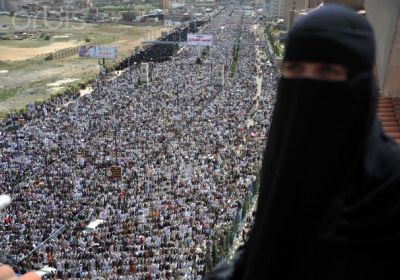 Pro-democracy protesters in Bahrain have gone on the offensive in the face of government repression and harsh sentences for activists arrested in the first wave of protests in February and March. Large protests began on September 23 against sham by-elections for Bahrain’s toothless parliament. Most people heeded the democracy movement’s call for a boycott — only about 17% turned out to vote, FT.com said on September 25. Police blocked attempts by protesters to reach the previous epicentre of the protests — the now-demolished Pearl Roundabout, known as Martyr’s Square by protesters.
Pro-democracy protesters in Bahrain have gone on the offensive in the face of government repression and harsh sentences for activists arrested in the first wave of protests in February and March. Large protests began on September 23 against sham by-elections for Bahrain’s toothless parliament. Most people heeded the democracy movement’s call for a boycott — only about 17% turned out to vote, FT.com said on September 25. Police blocked attempts by protesters to reach the previous epicentre of the protests — the now-demolished Pearl Roundabout, known as Martyr’s Square by protesters. -
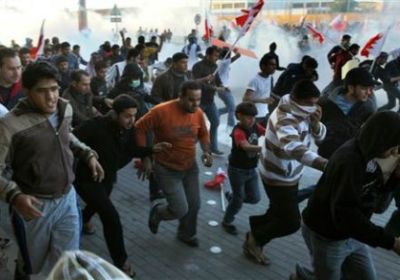 While the mainstream media have focused on the fall of Muammar Gaddafi's regime in Libya, democracy movements in Yemen, Syria and Bahrain have deepened despite severe repression. Hundreds of thousands of people rallied in Yemen's capital Sana'a on September 4, MorningStarOnline.co.uk said the next day. They demanded the removal of President Ali Abdullah Saleh. Thousands were prevented from rallying by military roadblocks. Five protesters were wounded when government troops opened fire on the rally.
While the mainstream media have focused on the fall of Muammar Gaddafi's regime in Libya, democracy movements in Yemen, Syria and Bahrain have deepened despite severe repression. Hundreds of thousands of people rallied in Yemen's capital Sana'a on September 4, MorningStarOnline.co.uk said the next day. They demanded the removal of President Ali Abdullah Saleh. Thousands were prevented from rallying by military roadblocks. Five protesters were wounded when government troops opened fire on the rally. -
The home of Nabeel Rajab, president of the Bahrain Centre for Human Rights (BCHR) was attacked on May 21, CNN.com said that day. It was the second attack on Rajab's house in a month. The BCHR said the attack occurred in the early hours of the morning while Rajab and his family were sleeping. It said the attackers launched teargas grenades into the house, breaking the window of Rajab's brother, the group said.
-
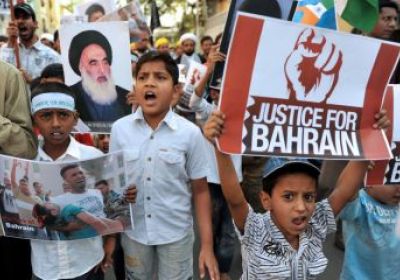
Protests across Bahrain that began on February 14 have rocked the US-backed Khalifa royal family, mobilising hundreds of thousands of people against the regime's repressive rule.
-
Februrary 14 was "The Day of Rage" against Bahrain's monarchy and dictatorship. As the government shut down radio broadcasters and stopped journalists from reporting on the situation, underground hip-hop artist Elreda wrote a song in dedication to the victims and the continuing protest that was not being broadcast to the western world.
-
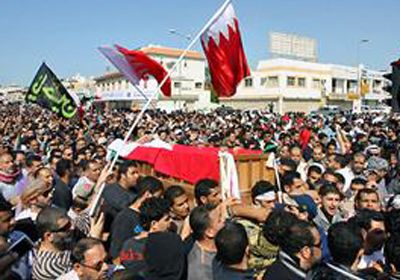
Despite appearing calm on the surface, tensions are escalating within Bahrain, which has been the scene of anti-government protests that began on February 14. There still remains a strong police presence within the country. Armoured tanks and vehicles man the streets and highways. Blockades are on major intersections, forces have set up camp temporarily within the city and are on a state of permanent standby for civil unrest.
-
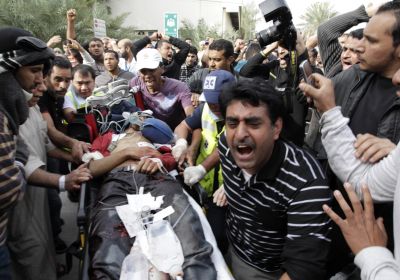 Sixty-two protesters had been killed by Syrian security forces on April 29, Al Jazeera reported that day. This was the second Friday in a row that Syrian authorities had used lethal forces against protesters — 100 protesters were killed in Deraa on April 22. The United States responded by imposing sanctions on three leading figures in the regime — including President Bashar al-Assad’s brother, but not the president — and the Syrian intelligence agency.
Sixty-two protesters had been killed by Syrian security forces on April 29, Al Jazeera reported that day. This was the second Friday in a row that Syrian authorities had used lethal forces against protesters — 100 protesters were killed in Deraa on April 22. The United States responded by imposing sanctions on three leading figures in the regime — including President Bashar al-Assad’s brother, but not the president — and the Syrian intelligence agency. -
The Bahraini government has ordered the dissolution of two opposition political parties. The move is part of its crackdown against the pro-democracy movement that broke out in February. The al-Wefaq and al-Amal parties were ordered to dissolve for “threatening peace”. The order is in response to their involvement in the protests that called for the removal of the Khalifah royal family, which has ruled the country for more than 200 years, the April 14 Washington Post said.
-
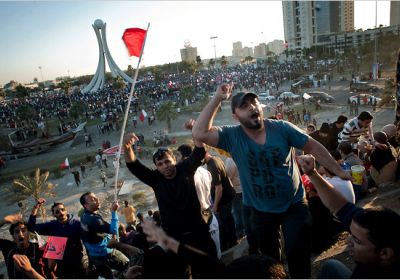 The pro-democracy movement in Bahrain has been severely weakened by the brutal wave of repression that began on March 15. Attempts to reignite pro-democracy protests have been broken up by government security forces and strikes have been called off. Troops from Saudi Arabia and the United Arab Emirates entered Bahrain on March 14 to help the Bahraini government “restore order” by attacking thousands of pro-democracy protesters.
The pro-democracy movement in Bahrain has been severely weakened by the brutal wave of repression that began on March 15. Attempts to reignite pro-democracy protests have been broken up by government security forces and strikes have been called off. Troops from Saudi Arabia and the United Arab Emirates entered Bahrain on March 14 to help the Bahraini government “restore order” by attacking thousands of pro-democracy protesters. -
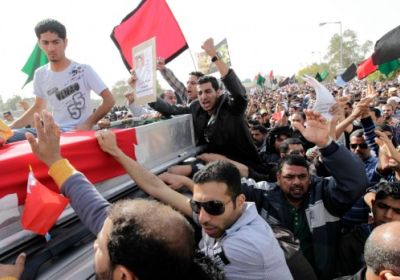 Despite their talk about democracy, the governments of the US and other Western nations are very interested in stopping the wave of democratic uprisings across the Arab world. The threat of real democracy is not compatible with the system of economic dominance and political control that the US enforces across the world. The US will do everything it can to stop the resource-rich Arab countries from escaping its clutches, especially when it has already spent so much effort on propping up tyrannical governments across the region.
Despite their talk about democracy, the governments of the US and other Western nations are very interested in stopping the wave of democratic uprisings across the Arab world. The threat of real democracy is not compatible with the system of economic dominance and political control that the US enforces across the world. The US will do everything it can to stop the resource-rich Arab countries from escaping its clutches, especially when it has already spent so much effort on propping up tyrannical governments across the region.
Bahrain
Bahrain